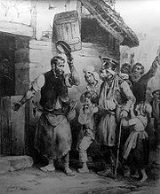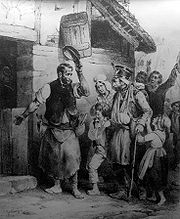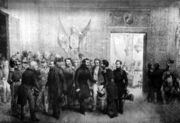
Great Emigration
Encyclopedia


Poland
Poland , officially the Republic of Poland , is a country in Central Europe bordered by Germany to the west; the Czech Republic and Slovakia to the south; Ukraine, Belarus and Lithuania to the east; and the Baltic Sea and Kaliningrad Oblast, a Russian exclave, to the north...
from 1831–1870. Since the end of the 18th century, a major role in Polish political life was played by people who carried out their activities outside the country as émigré
Émigré
Émigré is a French term that literally refers to a person who has "migrated out", but often carries a connotation of politico-social self-exile....
s. Their fate was a consequence of the Partitions of Poland
Partitions of Poland
The Partitions of Poland or Partitions of the Polish–Lithuanian Commonwealth took place in the second half of the 18th century and ended the existence of the Polish–Lithuanian Commonwealth, resulting in the elimination of sovereign Poland for 123 years...
, which completely divided the lands of the Polish-Lithuanian Commonwealth
Polish-Lithuanian Commonwealth
The Polish–Lithuanian Commonwealth was a dualistic state of Poland and Lithuania ruled by a common monarch. It was the largest and one of the most populous countries of 16th- and 17th‑century Europe with some and a multi-ethnic population of 11 million at its peak in the early 17th century...
between the Russian Empire
Russian Empire
The Russian Empire was a state that existed from 1721 until the Russian Revolution of 1917. It was the successor to the Tsardom of Russia and the predecessor of the Soviet Union...
, the Kingdom of Prussia
Kingdom of Prussia
The Kingdom of Prussia was a German kingdom from 1701 to 1918. Until the defeat of Germany in World War I, it comprised almost two-thirds of the area of the German Empire...
, and the Habsburg Monarchy
Habsburg Monarchy
The Habsburg Monarchy covered the territories ruled by the junior Austrian branch of the House of Habsburg , and then by the successor House of Habsburg-Lorraine , between 1526 and 1867/1918. The Imperial capital was Vienna, except from 1583 to 1611, when it was moved to Prague...
of Austria
Austria
Austria , officially the Republic of Austria , is a landlocked country of roughly 8.4 million people in Central Europe. It is bordered by the Czech Republic and Germany to the north, Slovakia and Hungary to the east, Slovenia and Italy to the south, and Switzerland and Liechtenstein to the...
. Because of this emigration of political elites, much of the political and ideological activity of the Polish intelligentsia during the 18th and 19th centuries was done outside of the lands of partitioned Poland.
Most of the political émigrés were based in France. The most important wave of emigration came after the November Uprising
November Uprising
The November Uprising , Polish–Russian War 1830–31 also known as the Cadet Revolution, was an armed rebellion in the heartland of partitioned Poland against the Russian Empire. The uprising began on 29 November 1830 in Warsaw when the young Polish officers from the local Army of the Congress...
of 1830–1831. These Poles later fought and provided valuable support during the 1846 and 1848 revolutions in Poland
Poland
Poland , officially the Republic of Poland , is a country in Central Europe bordered by Germany to the west; the Czech Republic and Slovakia to the south; Ukraine, Belarus and Lithuania to the east; and the Baltic Sea and Kaliningrad Oblast, a Russian exclave, to the north...
. Their resistance was not limited to Polish revolutionary activity, as they also participated in various lands during the Revolutions of 1848
Revolutions of 1848
The European Revolutions of 1848, known in some countries as the Spring of Nations, Springtime of the Peoples or the Year of Revolution, were a series of political upheavals throughout Europe in 1848. It was the first Europe-wide collapse of traditional authority, but within a year reactionary...
, including France, the small principalities of Germany and Italy, Austria
Austria
Austria , officially the Republic of Austria , is a landlocked country of roughly 8.4 million people in Central Europe. It is bordered by the Czech Republic and Germany to the north, Slovakia and Hungary to the east, Slovenia and Italy to the south, and Switzerland and Liechtenstein to the...
, Hungary
Hungary
Hungary , officially the Republic of Hungary , is a landlocked country in Central Europe. It is situated in the Carpathian Basin and is bordered by Slovakia to the north, Ukraine and Romania to the east, Serbia and Croatia to the south, Slovenia to the southwest and Austria to the west. The...
, and the Danubian principalities Wallachia
Wallachia
Wallachia or Walachia is a historical and geographical region of Romania. It is situated north of the Danube and south of the Southern Carpathians...
and Moldavia
Moldavia
Moldavia is a geographic and historical region and former principality in Eastern Europe, corresponding to the territory between the Eastern Carpathians and the Dniester river...
, the South American countries Argentina
Argentina
Argentina , officially the Argentine Republic , is the second largest country in South America by land area, after Brazil. It is constituted as a federation of 23 provinces and an autonomous city, Buenos Aires...
and Uruguay
Uruguay
Uruguay ,officially the Oriental Republic of Uruguay,sometimes the Eastern Republic of Uruguay; ) is a country in the southeastern part of South America. It is home to some 3.5 million people, of whom 1.8 million live in the capital Montevideo and its metropolitan area...
(participating in the "Guerra Grande") and later the Crimean War
Crimean War
The Crimean War was a conflict fought between the Russian Empire and an alliance of the French Empire, the British Empire, the Ottoman Empire, and the Kingdom of Sardinia. The war was part of a long-running contest between the major European powers for influence over territories of the declining...
. Additional waves of émigrés came after the failures of the attempted 1848 revolution and the January Uprising
January Uprising
The January Uprising was an uprising in the former Polish-Lithuanian Commonwealth against the Russian Empire...
of 1863–1864.
Notable Poles of the Great Emigration living in exile:
- Prince Adam Jerzy CzartoryskiAdam Jerzy CzartoryskiPrince Adam Jerzy Czartoryski was a Polish-Lithuanian noble, statesman and author. He was the son of Prince Adam Kazimierz Czartoryski and Izabela Fleming....
, leader of the Polish Government-in-Exile in Paris with embassies in London and Istanbul. - Joachim LelewelJoachim LelewelJoachim Lelewel was a Polish historian and politician, from a Polonized branch of a Prussian family.His grandparents were Heinrich Löllhöffel von Löwensprung and Constance Jauch , who later polonized her name to Lelewel.-Life:Born in Warsaw, Lelewel was educated at the Imperial University of...
- Fryderyk ChopinFrédéric ChopinFrédéric François Chopin was a Polish composer and virtuoso pianist. He is considered one of the great masters of Romantic music and has been called "the poet of the piano"....
- Adam MickiewiczAdam MickiewiczAdam Bernard Mickiewicz ) was a Polish poet, publisher and political writer of the Romantic period. One of the primary representatives of the Polish Romanticism era, a national poet of Poland, he is seen as one of Poland's Three Bards and the greatest poet in all of Polish literature...
- Leonard ChodźkoLeonard ChodzkoLeonard Borejko Chodźko was a Polish historian, geographer, cartographer, publisher, archivist, and activist of Poland's post-November-1830-Uprising Great Emigration.-Life:...
- Ignacy DomeykoIgnacy DomeykoIgnacy Domeyko or Domejko was a 19th-century geologist, mineralogist and educator who was born in Nesvizh, Imperial Russia , into a Polish-Lithuanian family...
- Juliusz Słowacki
- Cyprian Kamil Norwid
- Zygmunt KrasińskiZygmunt KrasinskiCount Napoleon Stanisław Adam Ludwig Zygmunt Krasiński , a Polish count, is traditionally ranked with Mickiewicz and Słowacki as one of Poland's Three National Bards — the trio of great Romantic poets who influenced national consciousness during the period of Poland's political bondage.-Life and...
- Jozef Krzucki
- Maurycy MochnackiMaurycy MochnackiMaurycy Mochnacki was a Polish publicist and independence activist. He participated in the November Uprising as a soldier and chronicler - Powstanie narodu polskiego w roku 1830 i 1831. After the defeat, he emigrated. In his early life, he was a supporter of Polish Jacobins ideology. He died in...
- Piotr Michałowski
- Seweryn GoszczyńskiSeweryn GoszczynskiSeweryn Goszczyński was a Polish Romantic prose writer and poet.Goszczyński did not receive a thorough education because his parents were not well off. He studied with breaks in different schools, the Basilian School in Humań being the one where he stayed the longest period of time. At this school...
- Jozef Bohdan ZaleskiJózef Bohdan ZaleskiJózef Bohdan Zaleski was a Polish Romantic poet. A friend of Adam Mickiewicz, Zaleski founded the "Ukrainian poetic school."-Life:...
- Aleksander MireckiAleksander MireckiAntoine Aleksander Mirecki , was a Polish violinist.He was born in 1809 in Chrzanów, but he lived in Kraków with his mother, Françoise Kutzkowska and his young father, the half-brother of the pedagog and compositor Franciszek Wincenty Mirecki. In 1826 he went to Warsaw and began military training...
- Emil KorytkoEmil KorytkoEmil Korytko was a Polish ethnographer, philologist and translator.Born in the village of Żeważa near Zaleszczyki in Austrian Galicia , he studied philosophy and philology at the University of Lwow, where he became acquainted with the Slovene philologist Matija Čop who taught at the University.He...
- Antoni PatekAntoni PatekAntoni Norbert Patek , is a Polish pioneer in watchmaking and a creator of Patek Philippe & Co. one of the most famous watchmaker companies.- Early life :...
- Casimir GzowskiCasimir GzowskiSir Kazimierz Stanislaus Gzowski, KCMG , was an engineer who served as acting Lieutenant Governor of Ontario from 1896 to 1897....
- Ignatius Szymanski
Some Poles emigrated not because of politics, but to pursue their life's goals. This was the case of Maria Curie-Skłodowska, who was unable to get accepted into any Russian universities (Poland was already partitioned) (due to her gender and anti-Polish repercussions of the January Uprising), and so decided to apply to the French universities.
See also
- Hôtel LambertHôtel LambertHôtel Lambert is a hôtel particulier, a grand mansion townhouse, on the Quai Anjou on the eastern tip of the Île Saint-Louis, Paris IVème; the name, Hôtel Lambert, was a sobriquet that designated a 19th-century political faction of Polish exiles, who gathered there.-Architectural history:The house...
- Polish Legions
- Polish minority in FrancePolish minority in FrancePoles in France, or the Polish community in France is one of the oldest in Europe.About one million people of Polish descent live in France, concentrated in the Nord-Pas de Calais region, in the metropolitan area of Lille and the coal-mining basin around Lens and Valenciennes...
- Union of National UnityUnion of National UnityZwiązek Jedności Narodowej was a secret organization formed by followers of Prince Adam Jerzy Czartoryski. A liberal-aristocratic fraction of the Polish Great Emigration, come into being on January 21, 1833....

